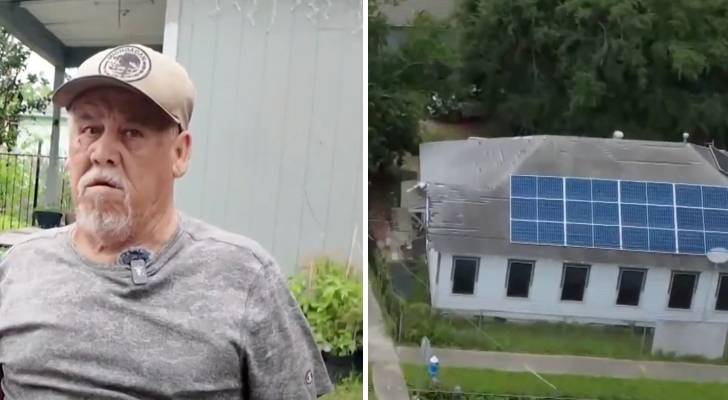
Isable Aguirre, a 72-year-old Houston resident, can’t read or write and speaks only Spanish. The senior also struggles with memory loss.
Don’t miss
- I’m 49 years old and have nothing saved for retirement — what should I do? Don’t panic. Here are 5 of the easiest ways you can catch up (and fast)
- You’re probably already overpaying for this 1 ‘must-have’ expense — and thanks to Trump’s tariffs, your monthly bill could soar even higher. Here’s how 2 minutes can protect your wallet right now
- Gain potential quarterly income through this $1B private real estate fund — even if you’re not a millionaire. Here’s how to get started with as little as $10
His stepson thinks these factors made Aguirre the perfect target for unscrupulous solar panel salespeople who left him in massive debt, according to a report from KPRC 2.
The senior said he doesn’t remember signing consenting or signing to buy solar panels that have been installed on his house since 2023. But his stepson, Oscar Garcia, believes that’s exactly how the trouble started.
“Even if you come to his house and tell him, ‘Hey, sign this and sign that,’ he will sign it,” Garcia told KPRC 2. “And then next time he’s like, ‘What did I sign?’”
Aguirre recalled, “I clearly told them I didn’t want that, and they ran away.”
But now, he has solar panels sitting on his roof, locked and inactive. No payments have been made on them, but he is staring down nearly $98,000 in debt.
Garcia said a lien has been placed on his stepfather’s home.
Solar panel complaints up over 800% in 5 years
Aguirre has lived in his Northside Village home for more than 15 years, and relies solely on Social Security for income.
According to Garcia, the sales team pitched a too-good-to-be-true story: “They were telling him something about that, I think Medicaid was going to pay for them or his Social Security was going to pay for them.”
Garcia wasn’t present when the deal went down, but a contract he shared with KPRC 2 names Texas Energy Resources Innovation as the contractor, and GoodLeap as the loan company now charging Aguirre.
Texas Energy Resources Innovation is not Better Business Bureau accredited and has an F rating for failure to respond to 15 complaints filed against it.
GoodLeap is BBB accredited and holds an A rating, but it’s also racked up over 1,000 consumer complaints in the last three years. The company was also named in a 2023 lawsuit by the Minnesota Attorney General, accusing it and three others of “making misrepresentations and engaging in other deceptive conduct while marketing their loans to prospective customers.”
According to a report from non-profit Texas Appleseed, solar-related consumer complaints to the Texas Attorney General’s Office jumped a massive 818% from 2018 to 2023.
Read more: Want an extra $1,300,000 when you retire? Dave Ramsey says this 7-step plan ‘works every single time’ to kill debt, get rich in America — and that ‘anyone’ can do it
“Many of the harmful practices targeted older Texans and people who are not native English speakers,” it said. “These practices included misleading statements that residents would no longer receive electric bills after panels were installed, false promises of government tax credits, and forgeries of signatures or other deceptive practices used to execute financing contracts.”
Common complaints included defective or damaged goods, problems with sales practices, failure to provide repairs, and unsatisfactory workmanship. In about 8% of cases, customers said they were billed for equipment or services that they never received.
Forty-two percent of the complaints involved solar loans, and another 11% mentioned leases, which are the two most common ways people pay for residential solar. GoodLeap and Solar Mosaic were the lenders most commonly cited in the complaints.
Lawmakers are paying attention. House Bill 1640 would require the Public Utility Commission of Texas to create a consumer guide for going solar. Meanwhile, Senate Bill 1036 aims to create a regulatory framework to protect consumers.
How to protect yourself
Thinking about going solar?
The Federal Trade Commission (FTC) warns that solar scams can begin with a phone call, a message on social media, or a simple knock at the door. Here are some things to keep in mind when dealing with solar salespeople:
-
There’s no such thing as free solar panels, even if someone claims the government will cover the cost under a special program.
-
Salespeople may exaggerate or lie about rebates, tax credits, or utility incentives that you can receive. Make sure to do the research and verify these facts yourself.
-
Don’t get pressured into signing on the spot or paying upfront or immediately.
-
Promotional rates or short periods of relatively low payments are often used to mask the true cost.
Solar can save money, but only if the deal is real and right for you. With the solar industry growing fast, it’s more important than ever to read the fine print, check company credentials, and never rush into a deal, no matter how sunny it sounds.
Vist the the U.S. Department of the Treasury’s Consumer Solar Awareness website for more useful information and guidance to avoid scams.
What to read next
- Don’t have the cash to pay Uncle Sam in 2025? You may already be eligible for a ‘streamlined’ handshake with the IRS — here’s how it works and how it can potentially save you thousands
- Robert Kiyosaki warns of a ‘Greater Depression’ coming to the US — with millions of Americans going poor. But he says these 2 ‘easy-money’ assets will bring in ‘great wealth’. How to get in now
- Here are 5 ‘must have’ items that Americans (almost) always overpay for — and very quickly regret. How many are hurting you?
This article provides information only and should not be construed as advice. It is provided without warranty of any kind.